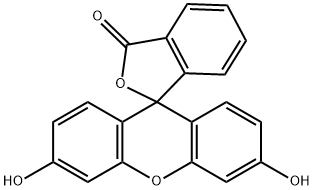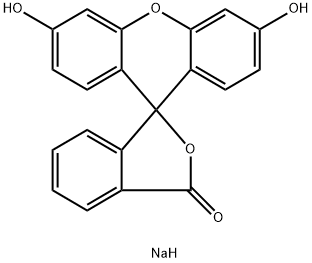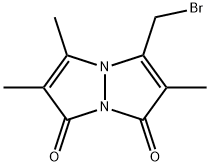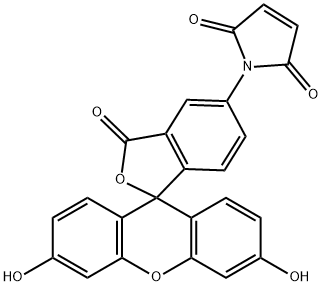Fluorescein , IND , 2321-07-5
Synonym(s):
Acid Yellow 73
CAS NO.:2321-07-5
Empirical Formula: C20H12O5
Molecular Weight: 332.31
MDL number: MFCD00005050
EINECS: 219-031-8
| Pack Size | Price | Stock | Quantity |
| 25G | RMB26.40 | In Stock |
|
| 100g | RMB89.60 | In Stock |
|
| 500g | RMB326.40 | In Stock |
|
| others | Enquire |
PRODUCT Properties
| Melting point: | 320 °C(lit.) |
| Boiling point: | 429.44°C (rough estimate) |
| Density | 1.2739 (rough estimate) |
| refractive index | 1.5000 (estimate) |
| storage temp. | room temp |
| solubility | Solubility Insoluble in water, ether, benzene, chloroform; soluble in ethanol, methanol, acetone, Iethyl acetate, N,N-dimethylformamide |
| Colour Index | 45350 |
| form | Powder |
| pka | 2.2, 4.4, 6.7(at 25℃) |
| color | Red to orange |
| PH Range | Pink uorescence (4.0) to green uorescence (6.0) |
| Water Solubility | insoluble |
| λmax | 493.5nm, 496nm, 460nm, 515nm |
| ε(extinction coefficient) | ≥12000 at 282-286nm ≥39000 at 236-240nm ≥70000 at 488-492nm |
| Merck | 14,4159 |
| BRN | 94324 |
| Stability: | Stable. Combustible. Incompatible with strong oxidizing agents. |
| Major Application | Organic light-emitting diode, nanoparticles, liquid crystal display, oil products, lip make-up, nucleic acid synthesis, amplification, sequencing and cloning, diagnosis of diabetic retinopathy, detecting yeast, multidrug resistance, proteins, antiHCV antibodies, target genes, enzymatic activity, nerve agent, nucleic acid sequences, imaging lung cancer, prostate cancer |
| Biological Applications | Detecting
chromosomal aberration; diagnosing corneal
diseases; marking/detecting insects; as antitumor
agent; as antihistaminic agent; use in agriculture
and plant cultivation; use in cosmetics; use in
ophthalmology; as a substrate for measuring
α-amylases activity, elastases activity, esterases
activity, β-glucuronidases activity, horseradish
peroxidases activity, kinases activity, monoamine
oxidases (MAOs) activity, phosphatases activity,
phospholipases activity, proteases/proteinases
activity, telomerases activity activity |
| LogP | 2.980 (est) |
| CAS DataBase Reference | 2321-07-5(CAS DataBase Reference) |
| EPA Substance Registry System | Fluorescein (2321-07-5) |
Description and Uses
Fluorescein is a synthetic organic compound available as a dark orange/red powder slightly soluble in water and alcohol. It is widely used as a fluorescent tracer for many applications.
Fluorescein is a fluorophore commonly used in microscopy, in a type of dye laser as the gain medium, in forensics and serology to detect latent blood stains, and in dye tracing. Fluorescein has an absorption maximum at 494 nm and emission maximum of 521 nm (in water). The major derivatives are fluorescein isothiocyanate (FITC) and, in oligonucleotide synthesis, 6-FAM phosphoramidite.
Fluorescein also has an isosbestic point (equal absorption for all pH values) at 460 nm. Fluorescein is also known as a color additive (D&C Yellow no. 7). The disodium salt form of fluorescein is known as uranine or D&C Yellow no. 8.
The color of its aqueous solution varies from green to orange as a function of the way it is observed: by reflection or by transmission, as it can be noticed in bubble levels in which fluorescein is added as a colorant to the alcohol filling the tube to increase the visibility of the air bubble and the precision of the instrument. More concentrated solutions of fluorescein can even appear red.
corneal trama indicator
Safety
| Symbol(GHS) |  GHS07 |
| Signal word | Warning |
| Hazard statements | H319 |
| Precautionary statements | P305+P351+P338 |
| Hazard Codes | Xi |
| Risk Statements | 43-36-36/37/38 |
| Safety Statements | 22-24/25-37/39-26-36/37/39-27 |
| WGK Germany | 3 |
| RTECS | LM5075000 |
| F | 10-21 |
| TSCA | Yes |
| HS Code | 32042000 |
| Hazardous Substances Data | 2321-07-5(Hazardous Substances Data) |




